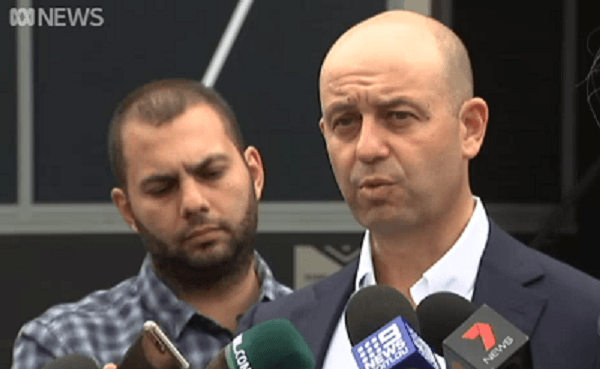The Panthers say May will ‘vigorously deny the charges’.
Former NRL player Steve Mortimer came under fire for his tone-deaf comments imparting blame on the women who were unknowingly filmed, suggesting women are ‘looking for a little bit of notice’ when they get together with players.
Mortimer has since apologised for his comments.
This is just the latest in a series of PR crises for the NRL in what has been a shocking start to the year, with the playing season yet to even commence.
In February, new Cowboys recruit Ben Barba was fired from the team and permanently de-registered with the NRL after allegedly being caught on CCTV assaulting his partner outside a Townsville casino. He was yet to play a single game for the club, after being offered a lifeline by the Cowboys following off-field antics that had him flagged as a liability since his first indiscretion back in 2013.
Late last year, St George player Jack de Belin and Shellharbour Sharks player Callan Sinclair were both charged with the aggravated sexual assault of a woman they met in a Wollongong nightclub.
Both men pleaded not guilty to the distressing incident.
In response to this recent spate of alleged crimes against women, the NRL is set to enact a ‘no-fault policy’ prior to the season kick off on March 14. The new rules mean that any player will be automatically stood-down from playing for their teams (on full pay) if charged with a serious criminal offence, until the matter has been legally resolved.
In a press conference on February 28, NRL CEO Todd Greenberg and ARL Commission chairman Peter Beattie explained that the policy is about reinforcing the NRLs code of conduct and repairing their tattered reputation:
“I want to make it clear this is no fault, we’re making no judgement whatsoever, in relation to any player charged with any offence. What we’re doing is setting a benchmark and standard for the game of rugby league,” Beattie says.
“This is not about being popular, this is about sending a clear message the game does not tolerate violence against women or children. Our job is to rebuild the reputation and protect the game. That reputation has been damaged by recent events. This is about a standard that’s expected.”
With an annual spend of eight million dollars on player education, the NRL may not be getting a great return on investment. Their ‘Respectful Relationships’ program and support of White Ribbon means nothing when players are consistently charged with violent offences towards women.
NRL gender adviser Catharine Lumby says that some players are just ‘education-proof’.
Could it be that the NRL has fostered a toxic culture for so long that players genuinely believe they can act with impunity?
Wife of former NRL player Ryan Hoffman, Mel Hoffman, believes this is the case, with sport considered an ‘island’ where star athletes are immune to social norms and laws.
In an opinion piece posted to her website, Hoffman writes:
‘And perhaps, over time, this relentless elevation of footballers above others, this constant operation within a space that proudly compares to no other, communicates a subconscious message about obedience that in some outposts then becomes dangerously twisted: I know the rules, but they don’t apply to me. If I break the rules, there’ll be no real consequences.’
Among players, there is an undeniably high incidence of law-breaking.
News.com.au journalist Luke Kinsella recently tracked NRL scandals between 2015 – 2019, finding that there have been 66 documented incidents in that time, including 12 allegations of violence against women.
In the past six months alone, six players have been accused of ‘serious offences against women’.
The reports of this kind of violent behaviour, however, have been well documented for many years – including against high profile players who have been welcomed back into the game and given chance after chance to further their football careers.
Ben Barba was a serial offender, guilty of illicit drug use and reportedly violent towards his long-term partner on more than one occasion. (Ainslie Currie has previously denied that Barba was violent towards her after photos of a facial injury were leaked. Barba, however, was reportedly stood down by the Bulldogs in 2013 for punching a woman in the face.)
The NRLs implementation of the no-fault policy is well overdue.
Up until now, they have offered too many protections to high performing players, sending a message that a talent for the game is more important than upholding their own code of conduct or even abiding by the law.
Is it any wonder that the NRLs reputation is at stake?


